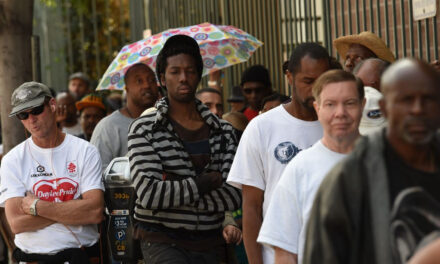
Cambodia Under Pressure to Stop Human Slavery

Up to 100,000 young men and women have been lured to Cambodia in recent years to work in cyber scam mills operated by Chinese criminals. According to a report by the LA Times, the Cambodian government is aware of the operation but has done little to stop it.
The victims – most hailing from Malaysia, China, Vietnam, Taiwan, and Hong Kong – are put to work running cyber and phone scams regarding fake real estate, romance schemes, money lending, counterfeit event tickets, and gambling. Those who meet their quotas are rewarded with basic necessities, while those who fail are tortured, resold, or worse.
Workers are housed in casinos, luxury hotels, dormitories, and even office complexes.
“You can tell by looking at the buildings,” says Ekapop Lueangprasert, a volunteer from Bangkok who works with a group that rescues and repatriates victims of forced labor. “The ones that are ringed with barbed wire fences and CCTV cameras are so clearly prisons to hold human trafficking victims…I think if the Cambodian government was serious about cracking down on human trafficking it wouldn’t be too hard.”
Soraton Charehkphunpol, age 20, traveled to Cambodia to start what he believed was a high-paying, entry-level customer service job. Like many other working-class individuals in Thailand, Soraton was struggling to make ends meet on a monthly salary of roughly $470.
Soon after arriving in the border city of Poipet, Soraton was ushered into a cramped apartment above a casino. “The bosses said if I tried to leave they would just sell me to another gang,” said Soraton. “That’s when I realized I was a slave.”
Rezky Rizaldi, a 32-year-old chef from Indonesia, found himself in a similar situation after responding to a job posting he saw on Facebook. After he escaped, Rezky shared stories of slaves being beaten, electrocuted, and deprived of food. One captive even had his fingers removed. Not surprisingly, escapees report high rates of depression, murder, and suicide.
When news of Cambodia’s human trafficking problem first hit the press, Prime Minister and former military commander Hun Sen claimed most of the foreign nationals working in Cambodia were doing so willingly and said issues between them and their employers were nothing more than simple contract disputes.
In July, the United States government dropped Cambodia to the lowest tier on its human trafficking index – putting it in the same category as Syria, Afghanistan, and North Korea. The designation was a severe embarrassment for a nation struggling to achieve international legitimacy (despite its close relationship with Chinese criminal syndicates and its repeated efforts to silence independent journalism).
In August, a Vietnamese news outlet published disturbing footage of foreign nationals attempting to flee a Cambodian casino while guards beat them with sticks. Roughly 40 individuals escaped the facility by swimming across the Binh Di River (which divides Cambodia and Vietnam) to safety.
In September, Cambodian law enforcement finally announced a series of raids designed to free thousands of workers imprisoned in the capital city of Phnom Penh.
“It was only after incontrovertible video evidence in media reports emerged combined with a chorus of diplomatic demands for nationals to be returned that the Cambodian authorities realized something needed to be done,” laments Sophal Ear, a political scientist at Arizona State University. “Cambodia’s international standing has fallen several rungs as a result of this.”
Analysts believe the raids were just for show, however, and suspect the workers were sold to gangs in other countries or relocated to remote areas of Cambodia. Unfortunately, Chinese criminals hold considerable influence in Cambodia and can sometimes convince the local police to return escaped slaves. In many cases, criminals are tipped off about upcoming raids and have time to evacuate before they are found.
Chen Baorong, a Chinese volunteer who helps rescue victims of forced labor, was arrested after a Cambodian governor accused him of causing ‘legal headaches.’ Chen was charged with incitement and interference with state procedures and sentenced to two years in jail.
–
The major problem here is Cambodia’s alliance with China. The Cambodian government doesn’t want to embarrass itself or interrupt money flow to Chinese criminals by making a real attempt to stop human trafficking.
From China’s point of view, Cambodia is a key strategic ally located along the South China Sea that serves as a counter to Vietnam. Indeed, Cambodia was among China’s first beneficiaries when Beijing launched its controversial Belt and Road initiative in 2013 and has opened the door to the lucrative gambling industry, which is banned throughout most of China.
According to AntiSlavery.org, there are roughly 50 million people enslaved today – that’s more than any time throughout history. Most are victims of human trafficking, forced labor, debt bondage, forced marriage, domestic servitude, and sexual exploitation. Each and every day, these individuals must endure the loss of basic freedoms or face detention, deportation, abuse, or death.
In many cases, individuals are forced or tricked into slavery when they are trying to escape poverty or assist family members. An estimated 25% of the world’s enslaved population are children.
Sources:
‘I was a slave’: Up to 100,000 held captive by Chinese cybercriminals in Cambodia
Cambodia’s modern slavery nightmare: the human trafficking crisis overlooked by authorities
The bleak world of trafficked children and modern slavery
Modern slavery: Sri Lankan Domestic Workers held captive in the Middle East
How Kafala system in Arab Gulf states is leading to the death of Kenyan girls




























This article states that these slaves are running cyber and phone scams. It is likely that the United States citizens are the targets of these scams, so the best way to combat them would be to demand that Congress disallow all spoofing of phone numbers and web sites. Then they should allow for reverse phone number lookup capabilities that are actually free, unlike all the ones out there that claim to be free, and then want to charge for the real report. Congress should also take steps to prohibit imports from nations with known slave labor issues. We, as a relatively wealthy nation, are funding much of this slavery. Once we quit sending money their way, the need for such slave labor would be diminished, if not eliminated.
between Islam and the CCP that battle to end slavery will last for ever. But as for the US we crises other countries where we have no business sticking or heads. As companies have pulled out manufacturing from the CCP to other surrounding countries. The CCP has just moved there operation to those surrounding countries. With the CCP enslaving the population of said countries. Until we move the manufacturing back to the US land nothing will change.
Not sure why Cambodia is your only focus: “Modern slavery is a multibillion-dollar industry with just the forced labor aspect generating US$150 billion each year.[124] The Global Slavery Index (2018) estimated that roughly 40.3 million individuals are currently caught in modern slavery, with 71% of those being female, and 1 in 4 being children.[125][126] As of 2018, the countries with the most slaves were: India (8 million),[127] China (3.86 million), Pakistan (3.19 million), North Korea (2.64 million), Nigeria (1.39 million), Indonesia (1.22 million), Democratic Republic of the Congo (1 million), Russia (794,000) and the Philippines (784,000).”
https://en.wikipedia.org/wiki/Slavery_in_the_21st_century
“The Walk Free Foundation reported in 2018 that 40.3 million people worldwide live in conditions that can be described as slavery. According to the foundation, more than 400,000 of those are in the United States. Andrew Forrest, founder of the organization, was quoted as saying that “the United States is one of the most advanced countries in the world yet has more than 400,000 modern slaves working under forced labor conditions”.[131] In March 2020, released British police records showed that the number of modern slavery offences recorded has increased by more than 50%, from 3,412 cases in 2018 to 5,144 cases in 2019. This coincided with a 68% increase in calls and submissions to the modern slavery helpline over the same time period.[132]
There is an estimate of 10,000 potential victims of modern slavery in the UK”
“As of 2018, the countries with the most slaves were: India (8 million),[127] China (3.86 million), Pakistan (3.19 million), North Korea (2.64 million), Nigeria (1.39 million), Indonesia (1.22 million), Democratic Republic of the Congo (1 million), Russia (794,000) and the Philippines (784,000).”
WIKI pegs the number at 40 million, others at 50 million. HOWEVER, 50% of forced labor and 25% of forced marriages are in middle to high income countries; that really sucks in that these countries would be the most affected, in the purse, if we took economic actions because of this.
Close to 50% of all slavery is forced marriage. 52% is forced labor. By definition, Cambodia’s forced labor is just a fraction of the world’s problem.
Did you read the article? Cambodia is just the current focus.
Again, not sure why Cambodia is the sole focus given the author notes the 50m persons world wide program.
Just thought I would round it out. Not sure Cambodia even hits the top five. We have 400,000 here just working, plus whatever the forced marriage numbers add.
But point taken as to the limits and focus of the copy/paste. Mine too 🙂
Not sure why Cambodia is your only focus: “Modern slavery is a multibillion-dollar industry with just the forced labor aspect generating US$150 billion each year.[124] The Global Slavery Index (2018) estimated that roughly 40.3 million individuals are currently caught in modern slavery, with 71% of those being female, and 1 in 4 being children.[125][126] As of 2018, the countries with the most slaves were: India (8 million),[127] China (3.86 million), Pakistan (3.19 million), North Korea (2.64 million), Nigeria (1.39 million), Indonesia (1.22 million), Democratic Republic of the Congo (1 million), Russia (794,000) and the Philippines (784,000).”
https://en.wikipedia.org/wiki/Slavery_in_the_21st_century
“The Walk Free Foundation reported in 2018 that 40.3 million people worldwide live in conditions that can be described as slavery. According to the foundation, more than 400,000 of those are in the United States. Andrew Forrest, founder of the organization, was quoted as saying that “the United States is one of the most advanced countries in the world yet has more than 400,000 modern slaves working under forced labor conditions”.[131] In March 2020, released British police records showed that the number of modern slavery offences recorded has increased by more than 50%, from 3,412 cases in 2018 to 5,144 cases in 2019. This coincided with a 68% increase in calls and submissions to the modern slavery helpline over the same time period.[132]
There is an estimate of 10,000 potential victims of modern slavery in the UK”
“As of 2018, the countries with the most slaves were: India (8 million),[127] China (3.86 million), Pakistan (3.19 million), North Korea (2.64 million), Nigeria (1.39 million), Indonesia (1.22 million), Democratic Republic of the Congo (1 million), Russia (794,000) and the Philippines (784,000).”
WIKI pegs the number at 40 million, others at 50 million. HOWEVER, 50% of forced labor and 25% of forced marriages are in middle to high income countries; that really sucks in that these countries would be the most affected, in the purse, if we took economic actions because of this.
Close to 50% of all slavery is forced marriage. 52% is forced labor. By definition, Cambodia’s forced labor is just a fraction of the world’s problem.
Hm, I wonder if all these countries will ever award reparation’s.